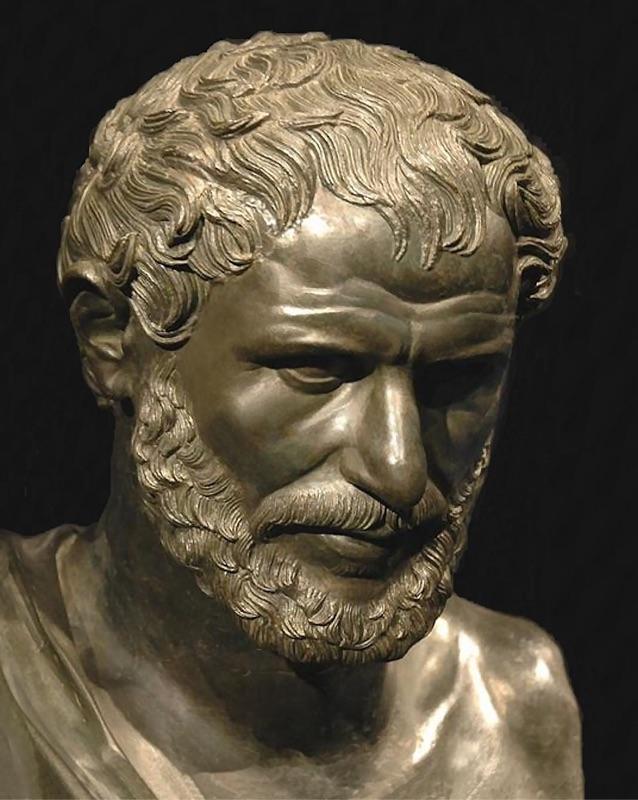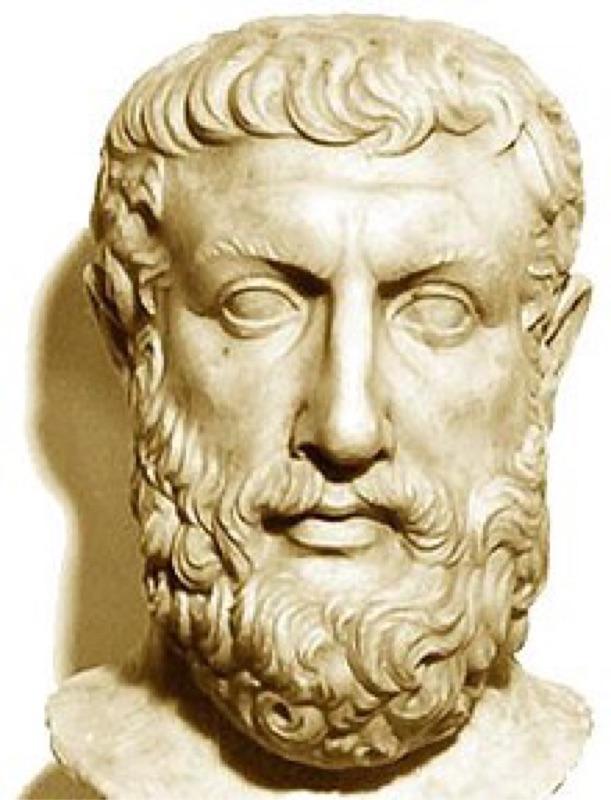Heraclitus and Parmenides: What is the Nature of the Universe?
Curated from: thecollector.com
Ideas, facts & insights covering these topics:
17 ideas
·4.56K reads
26
Explore the World's Best Ideas
Join today and uncover 100+ curated journeys from 50+ topics. Unlock access to our mobile app with extensive features.
What Is The Quintessential Characteristic Of Everything?
The roots of philosophy, or the Greek Tradition, can be traced back to one of the most profound questions posed by mankind: what is the quintessential characteristic of all things in this world? What is the common trait that we can identify in any object, creature, element or force? That has been a persistent question throughout our history, all the way back from the naturalistic explanations proposed by Thales of Miletus, and is still the driving force of scientific inquiry today.
45
682 reads
Flux Vs Stasis
Many different answers have been proposed throughout history, and two of these answers were very prominent during the pre-Socratic period in Ancient Greece: the flux of Heraclitus and the stasis of Parmenides.
The confrontation of these two great minds and their theories, and the conclusion of this confrontation was immeasurably important to philosophy as a whole.
45
488 reads
Heraclitus and Parmenides: Pre-Socratic Philosophers
In order to fully understand the discussion between Heraclitus and Parmenides, it is important for us to understand the pre-Socratic period as a whole.
The pre-Socratic period, or early Greek philosophy, encompasses all the philosophers between Thales of Miletus (c. 624/623 – c. 548/545 BC) and Socrates (c. 470 – 399 BC). It was a period marked by an intense interest in cosmology, that being the study of the origin and substance of the universe.
41
365 reads
Pre-Socratics And The Creation Of The Scientific Method
Many philosophers from the pre-Socratic period made their own cosmological systems and theories, and their work was foundational for Western philosophy, paving the way for the development of what we now call the scientific method, therefore leading to the creation of science as we know it today.
Some of the most influential minds of the pre-Socratic period were the aforementioned Thales and his fellow Milesians Anaximander and Anaximenes; the Ionians Heraclitus, Xenophanes and Pythagoras; the Eleatic of Parmenides, Melissus and Zeno, among many others.
40
322 reads
Heraclitus and the Doctrine of Flux
Heraclitus, born in the year of c.535 BC, was a native of a city called Ephesus, which was located inside the territory of the Persian Empire, and not much is known about his life. Some of the stories and registered recollections about him are now proven to be fabricated; however, it is believed that he was a man who gave up on his privileged life in order to become a misanthrope hermit and self-taught philosopher. He was a scholar in the matters of materialism, cosmology, empiricism, rationalism, metaphysics, mysticism and logic.
42
268 reads
Heraclitus: Fragments
Heraclitus wrote only one work, a scroll of papyrus that has been lost, although many fragments of said work have been quoted by a plethora of other authors, proving his undeniable influence not only on contemporary thinkers (notably Plato and Aristotle), but also to the philosophic tradition as a whole, being extensively mentioned by authors such as Nietzsche and Montaigne.
40
259 reads
The Nature Of All Things Is Impermanence
Τὰ πάντα ῥεῖ (ta panta rhei, everything flows) is an ancient Greek phrase that summarizes “the philosophy of flux” proposed by Heraclitus. Otherwise called “the theory of impermanence” and illustrated by the element of fire, the philosophy of flux is a system that seeks to explain how the nature of all things is precisely change. In other words, the common trait which we can universally identify in all things is the fact that they are subject to constant transformation, as exemplified by the process of aging in living beings, or the ever flowing nature of a river.
44
224 reads
It is not possible to step into the same river twice.
(No man ever steps in the same river twice, for it's not the same river and he’s not the same man.)
HERACLITUS
48
291 reads
Parmenides and the Philosophy of Stasis
Parmenides was a pre-Socratic philosopher from the city of Elea in Magna Graecia. It is believed that he lived during the late sixth or early fifth century BC, and he is considered the father of metaphysics, having founded the very prominent Eleatic school of philosophy. He originated from a wealthy family, being a well known and influential person in Elea.
38
226 reads
Parmenides: On Nature
Such as Heraclitus, Parmenides only wrote one known work, often referred as On Nature, and only some fragments of this work have survived the test of time as well. The writings of Parmenides are credited for containing the first sustained argument of philosophy and one of the first digressions into the concept of being. The influence of Parmenides is undeniable, his views are still relevant to this day, and the rivalry between him and Heraclitus is still brought up in many philosophical discussions and studies.
38
182 reads
The Nature Of All Things Is Permanence
The philosophy of Parmenides is based around the concept of stasis, which means that the universe is in constant balance, that things either exist or do not exist, and they cannot change. Everything exists as part of an unchanging nature, and what we may observe as transformations are merely illusory appearances. The nature of the universe is, therefore, permanence.
40
191 reads
Heraclitus And Parmenides’ Face-Off In Plato’s Sophist
The direct confrontation between the two opposite lines of thought happened in a dialogue recorded by Plato called Sophist.
This dialogue’s objective is to define through dialectic the difference between sophists and philosophers, being and not being, and to determine the nature of all things through the juxtaposition of the ideas of Heraclitus and Parmenides. Sophists were pre-Socratic teachers who were criticized by philosophers because they earned money for their teachings, while philosophers believed that knowledge should be spread for free.
38
160 reads
Illusory Appearance And True Form, Imperfection And Perfection
After presenting both the philosophy of flux and the philosophy of stasis, Plato then claims that they are, in fact, not mutually exclusive at all. If according to Parmenides everything has an innate and immutable essence, and according to Heraclitus all things are subject to constant change, we may conclude that the immutable essence of all things is change itself.
40
173 reads
The Physical Realm And The Realm Of Forms
This conclusion became the origin of Plato’s philosophy of Forms or the Theory of Ideas, which explores the concept that the world exists in two separate spheres: The Physical Realm and the Realm of Forms. The Physical Realm is how we perceive things, constantly changeable, imperfect. On the other hand, the Realm of Forms is perfect, its nature is immutable and unchangeable.
40
171 reads
Changeable Perceptions And Unchangeable Forms
Whenever we see a river, taking the example from Heraclitus, it is never the same river, because the water keeps ever flowing, changing, moving. However, our perception of that river is guided by the unchangeable concept of a river. Our changeable perceptions are guided by the unchangeable forms of what we perceive. The nature of the universe is both immutable and ever changing.
41
169 reads
Cosmology And Metaphysics, Science And Philosophy
The juxtaposition between the views of Heraclitus and Parmenides and its later conclusion marks a transition in the ancient Greek tradition, from the pre-Socratic period to the Platonic era, and offers a bridge between cosmology and metaphysics.
It provides us with two incredibly insightful explanations about the nature of the universe and an even smarter synthesis of these two apparently opposite systems.
39
179 reads
IDEAS CURATED BY
CURATOR'S NOTE
To philosophy’s oldest question, Greek philosophers Heraclitus and Parmenides answered with opposing views. Or did they?
“
Xarikleia 's ideas are part of this journey:
Learn more about philosophy with this collection
How to write clearly and concisely
How to use proper grammar and punctuation
How to structure a business document
Related collections
Similar ideas
Read & Learn
20x Faster
without
deepstash
with
deepstash
with
deepstash
Personalized microlearning
—
100+ Learning Journeys
—
Access to 200,000+ ideas
—
Access to the mobile app
—
Unlimited idea saving
—
—
Unlimited history
—
—
Unlimited listening to ideas
—
—
Downloading & offline access
—
—
Supercharge your mind with one idea per day
Enter your email and spend 1 minute every day to learn something new.
I agree to receive email updates


